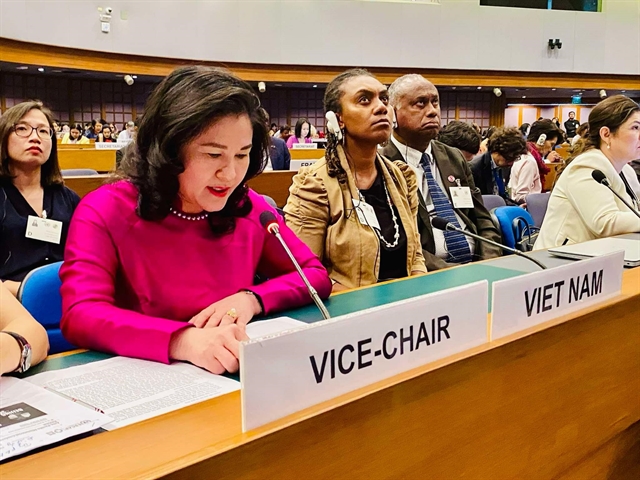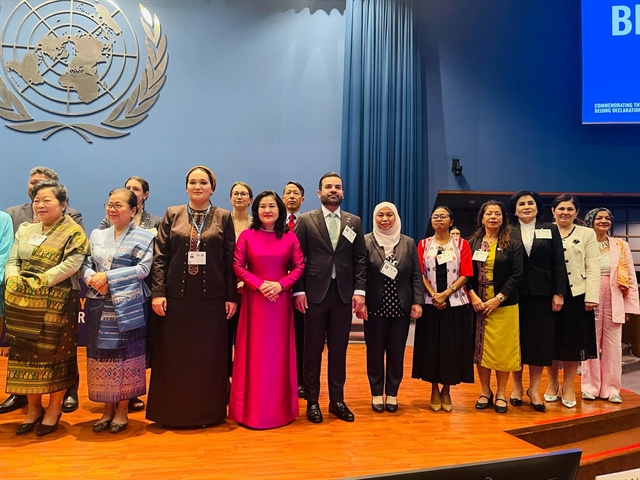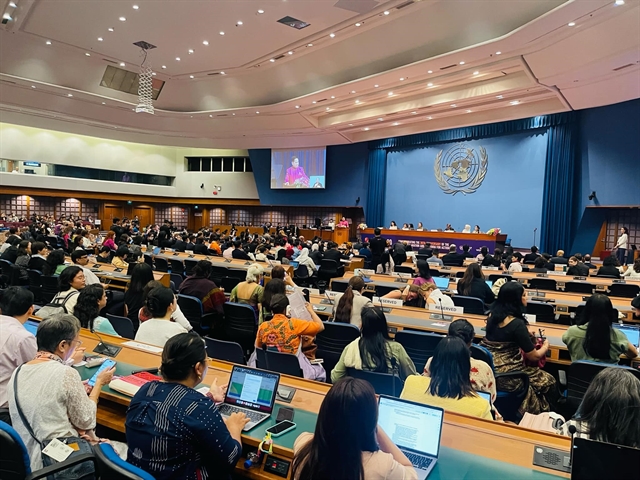Female representatives in National Assembly always high in Asia-Pacific region: Deputy Minister
Society – Economy - Ngày đăng : 14:54, 19/11/2024
 |
| Deputy Minister of Labour, Invalids and Social Affairs Nguyễn Thị Hà gives the country statement at the conference. — VNS Photo Thu Trang |
BANGKOK — Việt Nam ranked 72 out of 146 countries in the gender equality index this year, while the rate of female representatives in the National Assembly is always high and currently stands at 30.26 per cent.
That was the declaration made by Deputy Minister of Labour, Invalids and Social Affairs Nguyễn Thị Hà at the three-day Asia-Pacific Ministerial Conference on the Beijing+30 Review, which was officially launched on Tuesday at the United Nations Conference Centre in Thailand.
The Bangkok conference, which was convened by the Economic and Social Commission of Asia and the Pacific (ESCAP), in collaboration with the UN Women Regional Office for Asia and the Pacific, was set on the 30th anniversary of the fourth World Conference on Women and the Adoption of the Beijing Declaration and Platform for Action.
Over 1200 participants joined the conference and 27 side events on a wide range of topics related to gender equality and women’s empowerment.
Deputy Minister Hà confirmed that over the past 30 years and especially for the period 2019-2024, the Government of Việt Nam has been determined to realise the goals of the Beijing Declaration and Platform for Action and other international commitments on gender equality, notably the development and accomplishing national laws and policies.
“Việt Nam has seriously mainstreamed gender equality in the development of legal documents and policies to eliminate discriminatory regulations against women or men,” she said.
 |
| Deputy Minister Hà among ministry leaders from different countries in the Asia-Pacific region. — VNS Photo Thu Trang |
The Labour Code 2019, the Law on Prevention and Combat against Domestic Violence 2022, the Social Insurance Law 2024 and other legal documents have new regulations to ensure women's rights and promote gender equality, prevent and respond to gender-based violence and domestic violence.
The National Strategy on Gender Equality for the period 2021-2030 was adopted with a variety of goals, targets and solutions to narrow the gender gap, creating conditions and opportunities for women and men to equally participate and benefit from all areas of the social life, contributing to the sustainable development of the country.
In addition, programmes on communication and promoting gender equality in various fields have been implemented nationwide by the Government.
“The active participation of the government and socio-political organisations from central to local levels in implementing laws and policies has brought about important results,” said Hà.
Vietnamese women account for 46.8 per cent of the national workforce.
The labour force participation rate of female workers is 62.4 per cent.
The rate of women-owned businesses has reached 28.2 per cent. More and more outstanding Vietnamese female entrepreneurs and CEOs have been recognised and honoured by economic groups in the world.
In addition, the gender gap in all levels of education has been narrowed, the health care system has been strengthened for ethnic minority women and women who migrate from rural to urban areas, the service system to support victims of gender-based violence has been expanded and improved, according to the deputy minister.
“Based on the experience gained, Việt Nam believes that to achieve progress in gender equality, it is important to have common awareness that economic development must go along with social justice and progress, poverty reduction and care for vulnerable groups, especially women and children, further strengthening the state management of gender equality and mainstreaming gender equality in programs and initiatives at all levels and fields,” said Hà.
Though encouraging results have been achieved, like many other countries in the region, Việt Nam is facing a number of difficulties and challenges in this process.
Those are gender stereotypes which still exist and will take time to change, the lack of gender-disaggregated statistics, rapidly ageing population, along with the negative impacts of climate change, natural disasters and epidemics on people's lives, especially women and children.
 |
| Deputy Minister Hà affirms that Việt Nam has been determined to realise the goals of the Beijing Declaration and Platform for Action. — VNS Photo Thu Trang |
Therefore, we must uphold our high political determination, together with strategic solutions and the spirit of international cooperation to strive for a common cause, she said.
“With the desire to maintain and promote achievements in gender equality, Việt Nam is determined to implement the solutions stated in the National Review of the 30-year implementation of the Beijing Declaration and Platform for Action, aiming for successful implementation of the 2030 Agenda on sustainable development, and leaving no one behind in the development process,” she said.
Deputy Minister Hà affirmed that Việt Nam would continue to strengthen the partnership between the Government and relevant stakeholders, including the United Nations agencies, to maximise their support and outcomes of gender equality and women's advancement.
Beijing+30 Review
 |
| An overview of the conference. — VNS Photo Thu Trang |
As the world nears the 30th anniversary of the historic Beijing Declaration and Platform for Action (BPfA), ministers, senior officials, civil society, youth leaders, private sector representatives and UN experts attending the conference assessed regional progress.
They discussed emerging challenges and priority actions for accelerating gender equality and the empowerment of women and girls across Asia and the Pacific.
The conference aims to address these challenges and build momentum for actionable commitments to empower women and girls, with a vision for a more inclusive and sustainable future.
The conference also provides a platform for governments and other key stakeholders to explore policy options and strategies, including innovative approaches to address key issues that continue to hinder gender equality, such as economic disparities, gender-based violence, unpaid care work and the disproportionate impact of global crises on women and girls.
The outcomes of the conference will feed into a global review at the 69th Session of the Commission of the Status of Women (CSW) in March next year, which will focus on the review and appraisal of the implementation of the BPfA and the outcomes of the 23rd special session of the General Assembly.
Since the adoption of the BPfA in 1995, the Asia-Pacific region has made progress in reducing gender inequality and empowering women and girls.
Yet this progress belies stark remaining gaps. Progress has been uneven among different subregions, between and within countries, and among population groups of diverse backgrounds.
For the purpose of analysis, the 12 critical areas of concern outlined in the BPfA have been clustered into six thematic areas including poverty reduction and human capital development, shared prosperity and decent work, freedom from gender-based violence, meaningful participation and gender-responsive governance, peaceful and just societies, and gender and the environment.
These six areas take into consideration the change in context which has occurred since 1995 and the new challenges which emanate from new circumstances. — VNS
